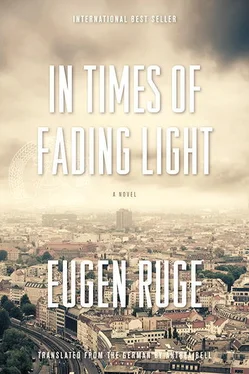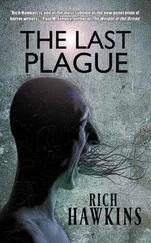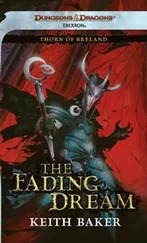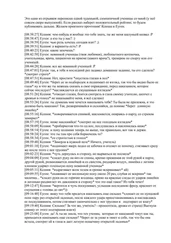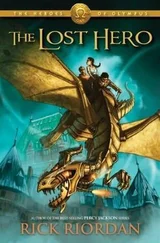Or so Alexander had believed. After the fall of the Berlin Wall and German reunification, he had thought that he could chalk that at least up as his own triumph. A line, he told himself, had now been drawn under all that. The alleged research, the half-truths and halfhearted arguments on the history of the German labor movement that Kurt had assembled—all of it, Alexander had thought, had fallen along with the Wall, and nothing would remain of Kurt’s so-called oeuvre.
But then, at the age of nearly eighty, Kurt sat down in his catastrophic chair again, to write his last book in secret. And although the book did not become an international success—yes, twenty years earlier a book in which a German Communist described his years in the gulag might indeed have been an international success, only Kurt hadn’t been brave enough to write it then—although it did not become an international success it was still, like it or not, an important, unique book, a book that would “live,” a book such as Alexander had never written and now probably never would.
Did he want to? Hadn’t he always said he felt drawn to the theater for the very reason that the theater was ephemeral? Ephemeral—sounded good. As long as you didn’t have cancer.
Midges danced in the sunlight, Kurt was still asleep—although they say old people don’t sleep as much as they used to. Alexander decided to lie down for a little while himself.
As he was about to leave the study, his eye fell on the folder labeled PERSONAL, a word that had always made him want to open it, but he had never dared to—although as a teenager he hadn’t shrunk from looking at his father’s collection of erotic photos. Until Kurt put a security lock on the cupboard door.
He took the folder out. Scraps of paper, notes. Copies of documents. On top, several letters written in violet ink, the usual color in Russia many years ago.
“Dearest Ira!” (1954)
Alexander leafed through them… typical of Kurt. He had written even his love letters accurately on both sides of the paper, in neat handwriting, all the pages filled to the last line, and the lines themselves at a regular distance from each other, never moving apart or crowding together at the end of a letter, never spilling over into the margin of a page anywhere… how on earth did the man do it? And then there was the irritatingly effusive manner in which he addressed Irina:
“Dear, dearest Irina!” (1959)
“My sun, light of my life!” (1961)
“My darling wife, my friend, my companion!” (1973)
Alexander put the folder back and climbed the stairs to Irina’s room. He lay down on the large sofa, which was covered with some kind of teddy-bear fabric, and tried to sleep a little. Instead, he kept seeing the pockmarked Karajan character rocking back and forth on his swivel chair like a clockwork figure. The lenses of his glasses flashed, his voice repeated the same thing over and over again… oh, the hell with it. He must think about something else. He had come to a decision, so there was nothing more to think about now, nothing to decide.
He opened his eyes. Looked at Irina’s cuddly toy animals sitting on the back of the sofa, neatly arranged side by side just where the cleaning lady had lined them up: the dog, the hedgehog, the rabbit with its singed ear…
Suppose they had all been wrong?
It was absurd, he thought, that right to the end Irina had described this room to him as your room. He could suddenly hear her voice in his ear again: You two can sleep up in your room. Yet it would be hard to imagine a room representing the perfect if delayed fulfilment of a girl’s dream better than this one. Pink walls. A rococo mirror, slightly damaged, but genuine. An escritoire desk painted white stood at the window. Irina had liked to pose here in pensive mood to have her photograph taken. And the delicate probably-also-rococo chairs, too, were posing in the room so attractively that you didn’t like to sit on them.
Indeed, as soon as he tried imagining Irina here, he saw her sitting on the floor in her solitary orgies, listening to her old cassettes of the singer-songwriter Vysotsky and slowly getting drunk.
And there was the telephone, still the old GDR phone that used to stand downstairs. Still the same phone on which she had said, tonelessly, those four words.
“Sashenka. You. Must. Come.”
Four words from the lips of a Russian mother who had prided herself on never in her life having asked her son for anything at all.
And after each word, a long, atmospheric crackle, so that he was tempted to think the connection had been broken and hang up.
And how about him? What had he said?
“I’ll come when you’ve stopped drinking.”
He stood up, went over to the white-painted escritoire with the secret compartment where they had found Irina’s stash of bottles after her death. He opened it, began searching it like an addict. Dropped on the sofa again. There were no bottles here now.
Or had he said “boozing”? I’ll come when you’ve stopped boozing.
Two weeks later, he had driven to the undertakers’ to bring his mother back to life… or no, he had gone because there were still some formalities to be dealt with. But on the road he had become obsessed by the idea that he could revive his mother if only he spoke to her. And after he had walked around the block twice, trying to talk himself out of the notion, he had finally gone in, asked to see his mother, and was not to be dissuaded even when the knowledgeable staff said it would be better for him to remember her “as she was in life.”
Then they had rolled her in. A curtain was drawn. He was standing beside a corpse, not particularly neatly laid out, that admittedly did bear some resemblance to his mother (apart from the face, which was too small, and the little pursed concertina-like folds of skin on the upper lip), he was standing beside her and didn’t dare to speak to her, not in front of the two assistant undertakers waiting behind the curtain, so close that he could see their shoes below its hem. He touched her hand, just so that he’d know he had tried something—and found it cold, cold as a piece of chicken when you take it out of the refrigerator.
No, they had not all been wrong. There was an x-ray picture. There was a CT scan. There were laboratory tests. It was clear: non-Hodgkin’s lymphoma, the slow-growing type. For which—how tactfully they put it!—there was as yet no effective treatment.
“So what does that mean, in terms of years?”
And then the man had rocked back and forth forever in his chair, looking as if it were unreasonable to expect him to answer such a question, and said, “You won’t get any prognosis from me.”
And his voice had rasped, like the sound of the old man’s oxygen apparatus in his room.
Measurements of time. Twelve years ago, the fall of the Wall. Inaccessibly far away now. All the same, he tried to trace the course of those years—what did twelve years amount to?
Of course the twelve years before the Wall came down seemed to him disproportionately longer than the twelve years after it. 1977—an eternity ago! Whereas since 1989—oh, it was like going down a slide, like a ride in a tramcar. And yet certain things had happened in that time, hadn’t they?
He had gone away and come back again (even if the country to which he came back had disappeared). He had taken a properly paid job with a martial arts magazine (and handed in his notice). Had run up debts (and paid them off). Had thought up a project for a film (forget it).
Irina had died: six years ago.
He had directed twelve or fifteen stage plays (in theaters of ever-decreasing importance). Had been to Spain. Italy, the Netherlands, the United States, Sweden, and Egypt (but not Mexico). Had fucked he couldn’t remember just how many women, or what their names were. And after a time of sleeping around had entered into something like an established relationship again…
Читать дальше
